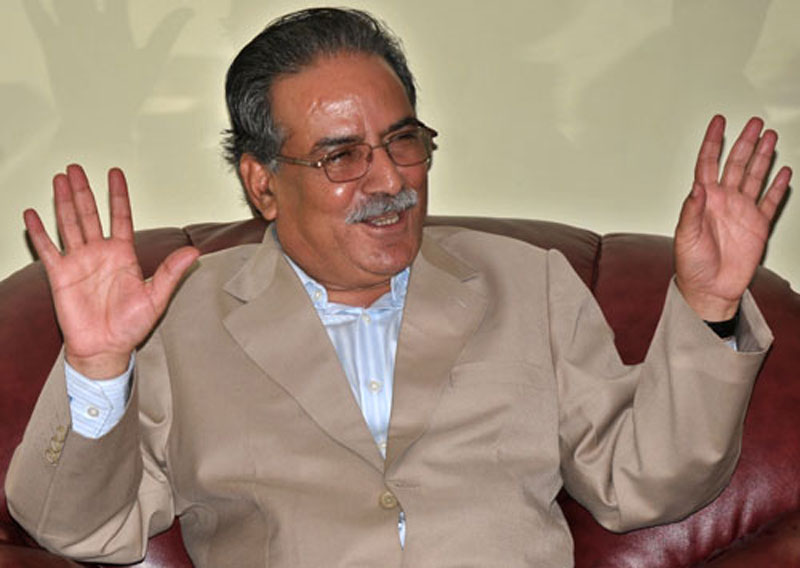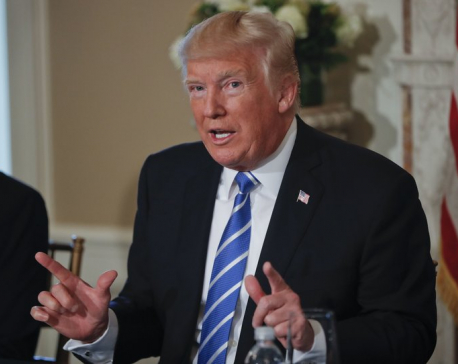
OR
PM Dahal’s China visit

More from Author
PM Dahal is in no position to agree to join China’s OBOR initiative or even for review of the 1960 Nepal-China friendship treaty
A cursory look at the agendas of our Prime Minister Pushpa Kamal Dahal’s planned visit to China makes a skeptic like me wonder if he will really visit China. The prime minister knows that his loyalty or commitment to China will be tested by the leadership in Beijing. But he is in no position to agree to China’s desire for Nepal’s formal commitment to One-Belt-One Road (OBOR) or to the review of the 1960 Nepal-China friendship treaty. I doubt if he is even mature enough to convince the Chinese leadership about Nepal’s position on those issues. If history is any guide, Dahal could postpone the visit at the last minute, just as he did to avoid discussing new treaty with China during his first tenure as prime minister in 2010.
Just before the 2010 visit, he used the then Chief of Army Staff Rookmangud Katawal as a scapegoat to create a political crisis and avoid going to China. The Chinese side then gradually stopped raising the issue of new treaty with Nepal formally and publicly. But this time, with Dahal as prime minister for the second time, the Chinese are at it again, this time not so much in favor of a new treaty, but just to test how accommodative Dahal is of Chinese interests. If the Chinese had wanted a new treaty, they could have raised the issue with previous governments and they would have gotten it, almost certainly during PM KP Oli’s visit to China last March. It goes without saying that by raising the issue again, China wants to gauge Indian influence in Nepal-China relations.
According to those in the know, the Chinese side is keen on replacing the old peace and friendship treaty with a new treaty to cement ‘strategic partnership’. It is not that China with the new treaty wants to enlist us as an ally against India, or that the new treaty will make China more influential in Nepal. It is just that the leaders in Beijing prefer using ‘strategic partnership’ to deal with other countries these days. But we tend to believe that strategic implies joining hands with China against India. Even if there are clauses in the draft sent by the Chinese that can create problems with India, we need to understand that China has submitted a draft that maximizes its interests, and it is open to negotiations with Nepal. China expects us to suggest changes but we fear that this might offend China, while accepting the Chinese draft will irk India. So we deliberately avoid the issue. That’s childish, to say the least.
Similarly, China wants Nepal’s formal commitment to OBOR. But given India’s dissatisfaction with the project, especially with the China Pakistan economic corridor, and OBOR’s challenge to India’s own Bangladesh-Bhutan-India-Nepal (BBIN) initiative, Nepal might be uncomfortable joining the initiative at present (for more on this, please see Biswas Baral’s March 16 article, “OBOR to India”). The Chinese side knows that this puts Nepal in a difficult spot, but China is still raising the issue in order to test Nepal’s autonomy in the conduction of its foreign policy. The Nepali side also understands this dynamic. But instead of dealing with the Chinese side maturely, we are acting childishly. And the Chinese side is visibly annoyed by our handling of the issue: for some strange reason our leaders seem to think that China is fine with our vague and non-committal attitude to what it considers its signature policy initiative.
However, if PM Dahal is honest with the Chinese on both these issues, China and Nepal can enter a new era of cooperation. He should agree to form a high level committee to review the treaty of 1960 in order to accommodate the vast changes in the interim period in both the countries and in the world. But he has to make it clear that Nepali side too will be preparing a separate draft of the new treaty. For there is no compulsion to accept the Chinese draft. As such things take time, it will take many rounds of high level negotiations to finalize a draft that is acceptable to both the countries (and he can use that time to assure the Indian side that the new treaty will not be targeted against it).
PM Dahal has to honestly tell the Chinese that given our geopolitical compulsions and India’s dissatisfaction with the OBOR we are in no position to join it now. Instead he can propose a China-Nepal economic corridor comprising infrastructure projects, independent of OBOR, and pledge to join the OBOR initiative when the right time comes. China may or may not agree, but it certainly will appreciate our honesty.
The Chinese side rightly views us as untrustworthy. Hence it feels that it also needs a reliable partner and that explains its efforts to be an influential player in Nepali politics. But China, it seems, is yet to figure out whom to trust in Nepal.
We make many promises but back out when it comes to implementing them. What is worse, we believe we can go on like this forever. Now is the time to change this status quoist mindset by being open and honest about our interests and priorities—we need to remain close to India given our unique geography and other factors, but that does not in any way mean we should take China lightly.
Nepal is just another neighbor for the China but for us, it is one of our only two neighbors and a very important one at that. Let’s not forget that China helped us even when it was poor, and now that it is rich, we can expect the same generosity, provided we deal with it maturely.
But it’s precisely this maturity that is missing in handling of our relations with other countries, including China. And that makes me ask again: Will PM Dahal really go to China, and if does, will he handle the issues maturely?
I have been wrong many times, and I hope to be proven wrong again by PM Dahal. Bon voyage, or as they say in Chinese, yi lu ping an, PM Dahal.
trailokyaa@yahoo.com
You May Like This

Make it happen now
Dear Malvika, I am now 28-year-old. As a young girl, I was good at studies. However, because of my financial... Read More...

Trump: If North Korea attacks US, it ‘will regret it fast’
NEW JERSEY, August 12: President Donald Trump on Friday issued fresh threats of swift and forceful retaliation against nuclear North... Read More...

Drawing it as it is
I came up with the name Miss Moti because a friend used to call me Moti. I wanted to change... Read More...




Just In
- Govt receives 1,658 proposals for startup loans; Minimum of 50 points required for eligibility
- Unified Socialist leader Sodari appointed Sudurpaschim CM
- One Nepali dies in UAE flood
- Madhesh Province CM Yadav expands cabinet
- 12-hour OPD service at Damauli Hospital from Thursday
- Lawmaker Dr Sharma provides Rs 2 million to children's hospital
- BFIs' lending to private sector increases by only 4.3 percent to Rs 5.087 trillion in first eight months of current FY
- NEPSE nosedives 19.56 points; daily turnover falls to Rs 2.09 billion
















Leave A Comment